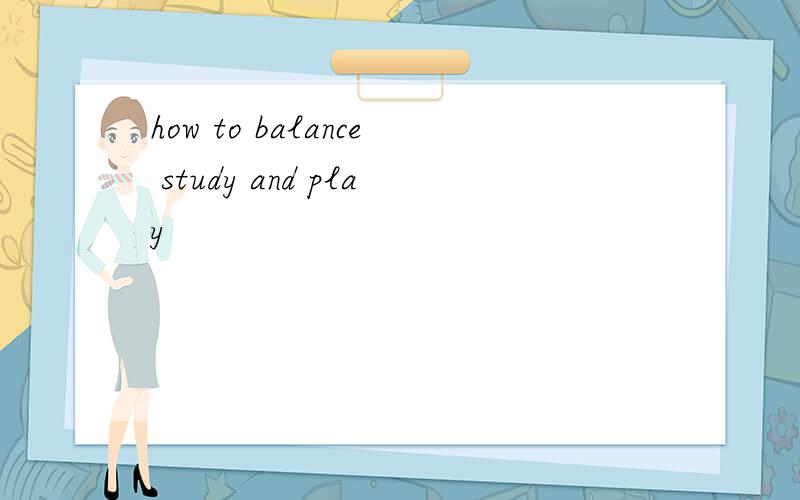how to balance study and play
来源:学生作业帮 编辑:大师作文网作业帮 分类:英语作业 时间:2024/11/10 19:08:17
how to balance study and play
200字左右,
200字左右,

Work/Play Balance At MIT
Work hard,play hard!
You may be surprised to find that MIT students - known for their challenging academic courseloads - make a lot of time in their schedules to participate in hundreds of activities outside of the classroom and lab.
A typical student courseload is four classes,and a typical class is 12 "units." A unit is meant to represent one hour per week that the average student will spend on the class.A typical courseload,therefore,requires about 48 hours a week for class,lab,homework,etc.That's a significant commitment,certainly,but there are 168 hours in a week - plenty of time for sports,arts groups,student government positions,clubs,research positions,sleep,and hanging out with friends.
One of the challenges of attending MIT is learning to balance a healthy social and extracurricular life with a demanding workload.Most adjusting takes place during freshman year and is facilitated by pass/no record grading in the first term.By the end of freshman year,students generally understand how to balance their time between work and fun.
Far from burying themselves in the library every night,MIT students pursue their college experiences through a variety of activities and venues.
Although schoolwork is important to MIT students,extracurricular participation is the rule rather than the exception.Approximately 80% of MIT undergraduates participate in athletics - 20% join varsity teams,73% play intramural sports,and 10% play club sports.Over 330 activities are recognized by the Association of Student Activities,and all of these groups enjoy robust participation.More than 60% of the student body is involved with the arts.
Students enjoy all that the cities of Boston and Cambridge have to offer,especially on weekends when they head into Boston to shop,dine,soak up culture,or go to a party at one of MIT's many fraternities.
Furthermore,students are involved in running every aspect of campus life,from the Undergraduate Association to leadership of each individual living group.Most MIT students were highly involved in extracurriculars in high school,and they have no intention of giving them up at MIT!
It's true that students work very hard at MIT,and you can probably count on pulling a few all-nighters in your four years.On the average night,however,students can get plenty of sleep if they manage their time wisely.Of course,sometimes it's more fun not to manage time wisely - when your floormates start a heated argument about the superiority of pi over e (or a battle of the sexes,or a discussion about the politics of race and gender,or a whipped cream and chocolate fight) at 2 AM on a school night,you'll put off that problem set for another time.And it will be okay.
Work hard,play hard!
You may be surprised to find that MIT students - known for their challenging academic courseloads - make a lot of time in their schedules to participate in hundreds of activities outside of the classroom and lab.
A typical student courseload is four classes,and a typical class is 12 "units." A unit is meant to represent one hour per week that the average student will spend on the class.A typical courseload,therefore,requires about 48 hours a week for class,lab,homework,etc.That's a significant commitment,certainly,but there are 168 hours in a week - plenty of time for sports,arts groups,student government positions,clubs,research positions,sleep,and hanging out with friends.
One of the challenges of attending MIT is learning to balance a healthy social and extracurricular life with a demanding workload.Most adjusting takes place during freshman year and is facilitated by pass/no record grading in the first term.By the end of freshman year,students generally understand how to balance their time between work and fun.
Far from burying themselves in the library every night,MIT students pursue their college experiences through a variety of activities and venues.
Although schoolwork is important to MIT students,extracurricular participation is the rule rather than the exception.Approximately 80% of MIT undergraduates participate in athletics - 20% join varsity teams,73% play intramural sports,and 10% play club sports.Over 330 activities are recognized by the Association of Student Activities,and all of these groups enjoy robust participation.More than 60% of the student body is involved with the arts.
Students enjoy all that the cities of Boston and Cambridge have to offer,especially on weekends when they head into Boston to shop,dine,soak up culture,or go to a party at one of MIT's many fraternities.
Furthermore,students are involved in running every aspect of campus life,from the Undergraduate Association to leadership of each individual living group.Most MIT students were highly involved in extracurriculars in high school,and they have no intention of giving them up at MIT!
It's true that students work very hard at MIT,and you can probably count on pulling a few all-nighters in your four years.On the average night,however,students can get plenty of sleep if they manage their time wisely.Of course,sometimes it's more fun not to manage time wisely - when your floormates start a heated argument about the superiority of pi over e (or a battle of the sexes,or a discussion about the politics of race and gender,or a whipped cream and chocolate fight) at 2 AM on a school night,you'll put off that problem set for another time.And it will be okay.
how to balance study and play
how to balance part-time and study
How do you achieve the balance between study and play?
重酬how to balance study and leisure activities
1.How to balance study and antivities in school
How to Achieve the Balance between Studies and Play
I learn how to balance between study and entertainment中how做句
1.Dormitory life2.How to balance study and hobby3.Food and a
We want to learn how to keep a balance between study and pia
How do you balance your study and extracurricular activities
how to balance between love and career!
How to balance work and life?